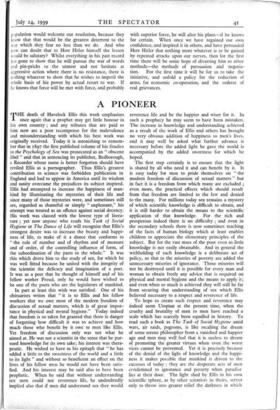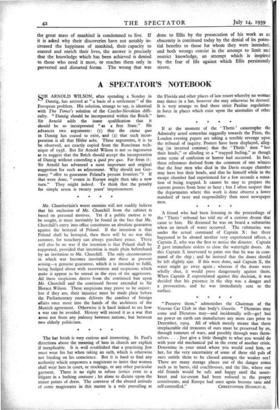A PIONEER
THE death of Havelock Ellis this week emphasises once again that a prophet may get little honour in his own country ; and any tributes that are paid to him now are a poor recompense for the malevolence and misunderstanding with which his best work was originally received. Today it is astonishing to remem- ber that in 1897 the first published volume of his Studies in the Psychology of Sex was prosecuted as an " obscene libel " and that in sentencing its publisher, Bedborough, a Recorder whose name is better forgotten should have reviled Ellis as a pornographer. Thus Ellis's greatest contribution to science was forbidden publication in England and had to appear in America until its wisdom and sanity overcame the prejudices its subject inspired. Ellis had attempted to increase the happiness of man- kind by illuminating the mysteries of their life and since many of those mysteries were, and sometimes still are, regarded as shameful or simply " unpleasant," his attempt was treated as an offence against social decency. His work was classed with the lowest type of litera- ture ; yet now anyone who reads his Task of Social Hygiene or The Dance of Life will recognise that Ellis's strongest desire was to increase the beauty and happi- ness of life, to make of it a dance that conforms to " the rule of number and of rhythm and of measure and of order, of the controlling influence of form, of the subordination of the parts to the whole." It was this which drove him to the study of sex, for which he was well fitted because he united with the integrity of the scientist the delicacy and imagination of a poet. It was as a poet that he thought of himself and of his fellow worker Freud, only he would have wished to be one of the poets who are the legislators of mankind.
In part at least this wish was satisfied. One of his obituarists writes that " it is to Ellis and his fellow workers that we owe most of the modern freedom of discussion of sexual matters, which is of great impor- tance in physical and mental hygiene." Today indeed that freedom is so taken for granted that there is danger of forgetting how difficult it was to achieve and how much those who benefit by it owe to men like Ellis. Yet freedom of discussion only was not what he aimed at. He was not a scientist in the sense that he pur- sued knowledge for its own sake; his interest was thera- peutic. He wished to have as his epitaph that " he has added a little to the sweetness of the world and a little to its light " and without so beneficent an effect on the lives of his fellow men he would not have been satis- fied. And his interest may be said also to have been prophetic. When he said that without understanding sex men could not reverence life, he undoubtedly implied also that if men did understand sex they would reverence life and be the happier and wiser for it. In such a prophecy he may seem to have been mistaken. The increase in knowledge and understanding achieved as a result of the work of Ellis and others has brought no very obvious addition of happiness to men's lives, and it may well be asked what further advance is necessary before the added light he gave the world is accompanied by the added sweetness for which he hoped.
The first step certainly is to ensure that the light is shared by all who need it and can benefit by it. It is easy today for men to pride themselves on " the modern freedom of discussion of sexual matters " but in fact it is a freedom from which many are excluded ; even more, the practical effects which should result from that freedom are limited to the few and denied to the many. For millions today sex remains a mystery of which scientific knowledge is difficult to obtain, and it is still harder to obtain the means to the scientific application of that knowledge. For the rich and prosperous indeed there is no difficulty ; and even in the secondary schools there is now sometimes teaching of the facts of human biology which at least enables children to appreciate the elementary principles of the subject. But for the vast mass of the poor even so little knowledge is not easily obtainable. And in general the withholding of such knowledge is a deliberate act of policy, so that to the miseries of poverty are added the unnecessary miseries of ignorance. Those miseries will not be destroyed until it is possible for every man and woman to obtain freely any advice that is required on physical and mental hygiene and the means to apply it; and even when so much is achieved they will still be far from securing that understanding of sex which Ellis believed necessary to a respect and reverence of life.
To hope to create such respect and reverence may indeed seem Utopian at the present time, when the cruelty and brutality of men to men have reached a scale which has scarcely been equalled in history. To read such a book as The Task of Social Hygiene amid wars, air raids, pogroms, is like recalling the dream of some serene philosopher from a vanished and happier age and men may well feel that it is useless to dream of promoting the greater virtues when even the worst vices cannot be prevented. Yet it is precisely because of the denial of the light of knowledge and the happi- ness it makes possible that mankind is driven to the excesses of today ; they are the desperate acts of men condemned to ignorance and poverty when paradise lies at their door. The light shed by Ellis in his own scientific sphere, as by other scientists in theirs, serves only to throw into greater relief the darkness in which the great mass of mankind is condemned to live. If it is asked why their discoveries have not notably in- creased the happiness of mankind, their capacity to control and enrich their lives, the answer is precisely that the knowledge which has been achieved is denied to those who need it most, or reaches them only in perverted and distorted forms. The wrong that was done to Ellis by the prosecution of his work as an obscenity is continued today by the denial of its poten- tial benefits to those for whom they were intended; and both wrongs consist in the attempt to limit and restrict knowledge, an attempt which is inspired by the fear of life against which Ellis persistently strove.











































 Previous page
Previous page